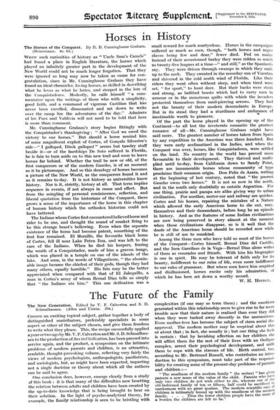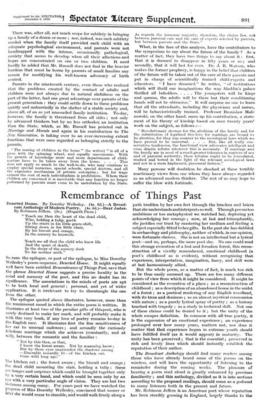The Future of the Family
The New Generation. Edited by V. F. Calverton and S. D. Schmalhausen. (Allen and Unwire. 20s.)
Cnoosu an exciting topical subject, gather together a body of distinguished contributors, preferably specialists in some aspect or other of the subject chosen, and give them freedom to write what they please. This, the recipe successfully applied a year or two ago by Mr. V. F. Calverton and Mr. S. D. Schmalhau- sen to the production of Sex in Civilization, has been pressed into service again, and the product, a symposium on the intimate problems of modern parents and children, is an attractive, readable, thought-provoking volume, reflecting very fairly the views of modern psychologists, anthropologists, paediatrists, and sociologists, but, as might have been expected, imparting not a single doctrine or theory about which all the authors can be said to agree.
One conclusion does, however, emerge clearly from a study .,f this book : it is that many of the difficulties now besetting the relation between adults and children have been created by the up-to-date knowledge that is being brought to bear on their solution. In the light of psycho-analytical theory, for example, the family relationship is seen to be bristling with
complexities (if one may so term them) ; and the emotions generated within this relationship seem to give rise to far more trouble now that their nature is realized than ever they did when they were tucked away decently in the =conscious. Even mother-love has become the subject of stem social dis- approval. The modern mother may be sceptical about this or about that ; in fact, she usually is ; but one thing she feels is certain : that by lavishing affection on her children she will afflict them for the rest of their lives with an Oedipus complex, arrest their psychological development, and unfit them to cope with the stresses of life. Birth control. toe according to Mr. Bertrand Russell, who contributes an intro- duction to this symposium, must take part of the responsi- bility for creating some of the present-day problems of parents and children: " The smallness of the modem family " (he writes) " has given parents a new sense of the value of the child. Parents who have only two children do not wish either to die, whereas out of the old-fashioned family of ten or fifteen, half could be sacrificed to carelessness with no great qualms. The modem scientific, care of children is intimately bound up with the smallness of the modem family. . . . Thus the fewer children people have the more of a burden the children are felt to be."
There was, after all, not much scope for subtlety in bringing up a family of a dozen or more ; nor, indeed, was such subtlety needed when the family itself provided each child with an adequate psychological environment, and parents were not handicapped with the intense, occasionally pathological, anxiety that seems to develop when all their affections and hopes are concentrated on one or two children. It need hardly be added that Mr. Russell does not find in the heavier burdens that must be borne by parents of small families any reason for modifying his well-known advocacy of birth control.
Parents in the nineteenth century, even those who realized that the problems created by the contact of adults and children were not always due to natural sinfulness on the part of the latter, had one great advantage over parents of the present generation : they could settle down to these problems quietly and unhurriedly in the shelter of a stable society and, above all, of an as yet unassailed family institution. To-day, however, the family is threatened from all sides ; not only by advanced thinkers but by no less orthodox an institution than the State, which, as Mr. Russell has pointed out in Marriage and Morals and again in his contribution to The New Generation, is taking over to an ever-increasing extent functions that were once regarded as belonging strictly to the parents.
" The rearing of children in the home " (he writes) " is all of a piece with the spinning wheel, and equally uneconomic. With the growth of knowledge more and more departments of child- nurture have to bo taken away from the home. . . . This does not apply so much to the well-to-do, who may continue to employ special nurseries, special schools, special doctors, and all the expensive mechanism of private enterprise-; but for wage earners the cost of such individualism is prohibitive. Where their children are concerned it is inevitable that any function no longer performed by parents must come to be undertaken by the State.
As regards the immense majority, therefore, the choice lies, not between parental cam and the rare of experts selected by parents, but between parents and the State."
What, in the face of this analysis, have the contributors to the symposium to say about the fixture of the family ? As a matter of fact, they have two things to say about it : first, that it is doomed to disappear in fifty years or so ; and secondly, that it will last for ever. Dr. J. B. Watson, who makes the former prophecy, is happy in the belief that children of the future will be taken out of the care of their parents and put in charge of scientifically trained child-experts and educators. " I have dreamed," he writes, " of institutions which will thrill our imaginations the way Aladdin's palace
thrilled all beholders The youngsters will be kings and queens, the adults will be there but their conditioning hands will not be obtrusive." It will surprise no one to learn that all the attendants, including the physicians and nurses, will be behavioristically trained. Professor Bronislaw Mali- novrski, on the other hand, sums up his contribution, u state- ment of his theory of kinship based on over twenty years' work on the subject, as follows :-
" Revolutionary decrees for the abolition of the family and foe the substitution of legalized free-love for marriage are bound to be abortive, for they run counter to the sociological laws which wo have proved to be universal. . . . But, like all really con- servative tendencies, the functional view advocates intelligent and even drastic reform wherever this is necessary. If marriage and the family aro in need of a much greater tolerance in matters of sox and of parental authority, these reforms ought to be formulated, studied and tested in the light of the relevant sociological laws and not in a mere haphazard, piecemeal fashion."
Many persons will doubtless be shocked at these terribly reactionary views from one whom they have always regarded as an advanced modem thinker. The rest of us may hope to suffer the blow with fortitude.



























































 Previous page
Previous page